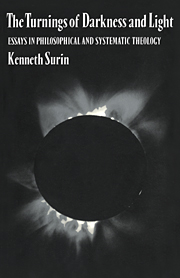Book contents
- Frontmatter
- Contents
- Dedication
- Preface
- Abbreviations
- 1 Creation, revelation and the analogy theory
- 2 The Trinity and philosophical reflection: a study of David Brown's The Divine Trinity
- 3 ‘Is it true what they say about “theological realism”?’
- 4 The impassibility of God and the problem of evil
- 5 Theodicy?
- 6 Tragedy and the soul's conquest of evil
- 7 Atonement and moral apocalypticism: William Styron's Sophie's Choice
- 8 Atonement and christology
- 9 Revelation, salvation, the uniqueness of Christ and other religions
- 10 ‘Many religions and the one true faith’: an examination of Lindbeck's chapter 3
- 11 Contemptus mundi and the disenchanted world: Bonhoeffer's ‘discipline of the secret’ and Adorno's ‘strategy of hibernation’
- 12 ‘The weight of weakness’: intratextuality and discipleship
- 13 ‘Theistic arguments’ and ‘rational theism’
- Notes
- Index of names
- Index of subjects
1 - Creation, revelation and the analogy theory
Published online by Cambridge University Press: 19 January 2010
- Frontmatter
- Contents
- Dedication
- Preface
- Abbreviations
- 1 Creation, revelation and the analogy theory
- 2 The Trinity and philosophical reflection: a study of David Brown's The Divine Trinity
- 3 ‘Is it true what they say about “theological realism”?’
- 4 The impassibility of God and the problem of evil
- 5 Theodicy?
- 6 Tragedy and the soul's conquest of evil
- 7 Atonement and moral apocalypticism: William Styron's Sophie's Choice
- 8 Atonement and christology
- 9 Revelation, salvation, the uniqueness of Christ and other religions
- 10 ‘Many religions and the one true faith’: an examination of Lindbeck's chapter 3
- 11 Contemptus mundi and the disenchanted world: Bonhoeffer's ‘discipline of the secret’ and Adorno's ‘strategy of hibernation’
- 12 ‘The weight of weakness’: intratextuality and discipleship
- 13 ‘Theistic arguments’ and ‘rational theism’
- Notes
- Index of names
- Index of subjects
Summary
The heart of St Thomas Aquinas's views on the nature of language about God is his thesis that all assertions about God are to be construed analogically. Aquinas offers this as one thesis, but it is fruitful to regard it as consisting of two separate claims: a linguistic subthesis, which provides for the formulation of analogy rules governing the meaning derivations of terms in natural language; and a metaphysical subthesis, designed to facilitate the application of these rules to theistic language, by expressing the truth (as Aquinas saw it) of the cosmological relation that exists between God and the objects of creation. One of the main purposes of this essay will be to argue that the theology of revelation requires us to construe this relation between God and the world as an ontic (or ontological), and not a cosmological, relation. That is, the theology of revelation behoves us to construe the relation between God and the world as an ‘isomorphism’ of being, antecedent to any act of divine creation, and not as something which is the mere consequence of God's creative act (as would be the case in a cosmological relation).
Aquinas's two subtheses
(AL) Natural language has two analogy rules, one for ‘attribution’ and the other for ‘proper proportionality’, which specify that the instances of a term are analogues if they instantiate a semantic property (of the term in question) which conforms in its use to either or both of these rules.
- Type
- Chapter
- Information
- The Turnings of Darkness and LightEssays in Philosophical and Systematic Theology, pp. 1 - 19Publisher: Cambridge University PressPrint publication year: 1989
- 1
- Cited by



